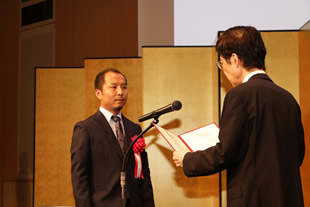 The 24th Asia Pacific Research Prize winner: Dr. Zhou Jun
The 24th Asia Pacific Research Prize winner: Dr. Zhou Jun
Title of Dissertation: “The Nerves of Chinese Communist Party: An Analysis of the Origin, Structure and Function of the Information Gathering and Processing System (1940s-1950s)”

- Dr. Zhou Jun
-
- Career -
Zhou Jun, a historian of modern China, an assistant professor at Graduate School of Intercultural Studies, Kobe University. Zhou received the Ph.D. in 2023 from Graduate School of Asia-Pacific Studies, Waseda University. He focuses on the history of the Chinese Communist Party, information flow in the socialist system, Mao Zedong's thought and his cognitive bias. His scholarly monographs: The Nerves of Chinese Communist Party: the Origin, Structure and Function of the Information System (The University of Nagoya Press, 2024); Catalogue of Materials on China's Modern History: Internal Periodicals in the Mao Era (Global China Research Base, Institute of Social Science, The university of Tokyo, 2023).
- Summary -
This paper systematically and empirically examines the origins, structure, and functions of the Chinese Communist Party’s information system, which has previously received little scholarly attention. Drawing on a wide range of primary and secondary sources from China, the USSR, the United States, Japan, Taiwan, and various other regions worldwide, the study situates the CCP’s information system within broader international contexts, including the twentieth-century international communist movement and the Cold War.Modern society has long been referred to as an information society. However, though research on the history of the Chinese Communist Party is extremely specialized and a great deal of prior research exists on most events and phenomena in domestic and international academia, it can be said that there is virtually no previous research on the Party's information system. In contrast, this paper, which tackles a topic that could be described as the most unexplored of all, presents a novel historical image of the Chinese Communist Party seen from the perspective of “information.”
Specifically, Chapter 1 focuses on the battle between espionage operations by the United States and other countries, as well as the Chinese Communist Party's secrecy system, to shed light on the environment surrounding the Communist Party's information system. Chapters 2 through 6 discuss the influence of the political ideology of the USSR and examine the historical development, institutional structure, and operational aspects of the secret communication networks and various information routes that support the operation of the information system. Subsequently, Chapter 7 analyzes when and how Communist Party leaders obtained the information needed for governance and policy making, and how such information was used in policy decisions, using an example of the formulation process of the Great Leap Forward policy, which resulted in the deaths of tens of millions of people from starvation.
Furthermore, in political science, dictatorships are understood to be closed systems and as a consequence of their repressive rule, dictators are often thought to face the dilemma of how to obtain accurate information. To significantly revise this "Emperor's New Clothes"-like theoretical framework, this paper presents a new interpretation that the essence of the problem lies in Mao Zedong's cognitive bias, which caused him to use only the information that was convenient for him even when he was given correct information, and his body of knowledge that lay behind it. The paper then approaches a universal question that transcends time and national systems as to how to deal with information and cognitive bias.
Overall, this paper not only offers a new understanding of the political structure of modern China but also brings about a paradigm shift in conventional political history research by introducing new elements of information and cognition, thereby opening up new horizons.






